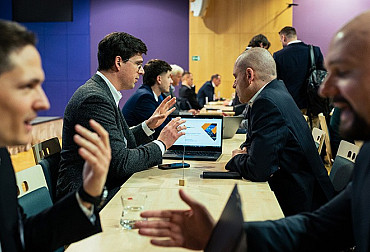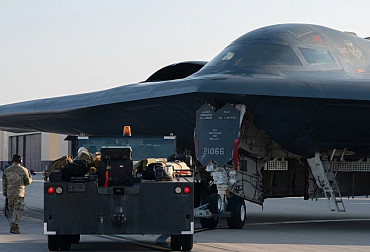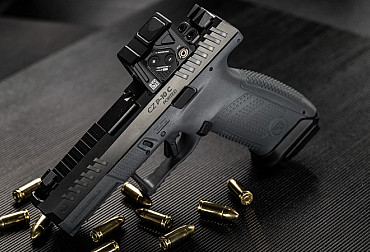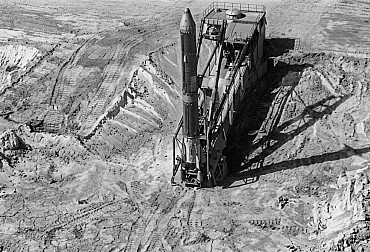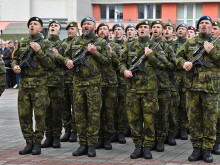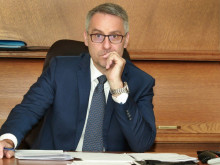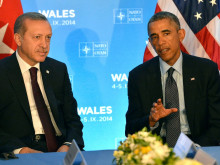The Defence Committee mainly dealt with the planned acquisitions of the Army for this year
The introduction of the new Director of the War Veterans Department, the 5th Supplement on the participation of the Armed Forces of the Czech Republic in military exercises outside and on the territory of the Czech Republic, information on the tactical air force, the planned purchase of CV90 tracked IFVs and other acquisitions for 2023 – this was the agenda of this year's first meeting of the Defence Committee, from which a number of members excused themselves. Although there were only seven Members present, a quorum was present, according to the Rules of Procedure of the House. Guests of the Committee meeting included, for example, First Deputy Minister of Defence František Šulc, who replaced Jana Černochová, the Chief Director of the Armaments and Acquisitions Section of the Ministry of Defence Lubor Koudelka and the First Deputy Chief of the General Staff, Maj. Gen. Ivo Střecha.
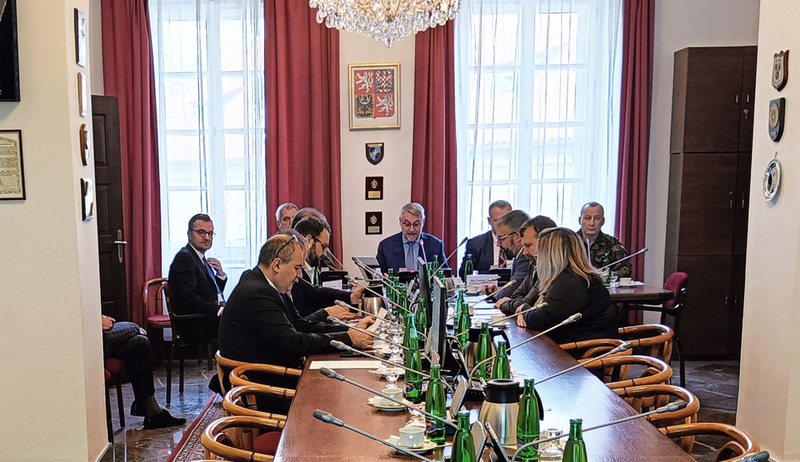 Picture: Presentation of the new director of the Department for War Veterans, 5th supplementary on the participation of the Armed Forces of the Czech Republic in military exercises outside and on the territory of the Czech Republic, information on tactical aviation, the planned purchase of CV90 tracked IFV and other acquisitions for 2023 – this was the agenda of this year's first meeting of the Defence Committee. | Jan Zilvar / CZ DEFENCE
Picture: Presentation of the new director of the Department for War Veterans, 5th supplementary on the participation of the Armed Forces of the Czech Republic in military exercises outside and on the territory of the Czech Republic, information on tactical aviation, the planned purchase of CV90 tracked IFV and other acquisitions for 2023 – this was the agenda of this year's first meeting of the Defence Committee. | Jan Zilvar / CZ DEFENCE
In the introduction, Deputy Minister Šulc introduced the new Director of the upgraded Department for War Veterans and War Graves, Colonel Robert Speychal, noting that Colonel Speychal took over the leadership of the said Department on 1 November last year and highlighted his professional, managerial and military experience. "For ten years, he served as the chairman of the Commission of Military Traditions and Symbols of the Military History Institute Prague. His great involvement in associations or his broad knowledge of organisations and the issues of associations' activities was also an important asset," the deputy said. Subsequently, the new director of the committee presented his vision in activities for war veterans. "First and foremost, it is about expanding the activities of the department not only for war veterans, but also taking care of war graves. The department will also be involved in the activities of various associations and foundations and especially expanding the range of care for war veterans," Speychal continued. According to the new director, subsidy programmes are also important, especially for the POKOS project (preparing citizens for national defence) and war veterans. Mapping the number of war veterans, especially the modern ones, is also an important moment. According to Speychal, there are about 4,000 missing from the register. In total, there are over 16,000. The new director also believes it is important to develop social programmes, expand the activities of community centres and possibly link them with the recruitment centres of the Czech Armed Forces so that recruits can perceive that the army will take care of its soldiers after they leave the service. Speychal said there are almost 38,000 war graves in the Czech Republic. In addition, 14,000 memorial sites are registered. There are about 3,500 Czech war graves abroad in forty-four countries, which Speychal said is our rather important foreign policy asset. "In addition, we estimate that approximately 4,000 graves of our fallen from both World War I and World War II are undiscovered," said Speychal, who has high hopes for the digitization of war graves abroad, especially in unstable areas such as present-day Russia. On the other hand, Speychal highlighted cooperation with Ukraine, where a memorial to the fallen Czech soldiers who defended the site is due to be erected this year on the anniversary of the Battle of Sokolov.
The deputies also discussed the addition of the Czech Legacy exercise to the list of exercises of the Czech Army. This is an exercise aimed at deepening the interoperability capabilities of members of the staffs and ground units of the Armed Forces of Ukraine in tactical activities. An important part of this exercise will also be the exchange of experience between combat, combat support and security units. The exercise took place in two separate phases from 13 November to 22 December last year on the territory of the Czech Republic and involved a total of 609 members of the Armed Forces of Ukraine. In the first stage, 18 medical specialists, 10 chemical specialists and 20 engineer specialists were involved. The second stage was attended by 561 members of the mechanised battalion. A total of 800 members of the Ukrainian army will take part in the exercise by the end of this year. Střecha appreciated that the planning of the whole training was done in record time and the preparation lasted only a few weeks. The training focused mainly on the areas of EOD (Explosive Ordinance Disposal) and CLS (Combat Lifesaver). In both areas our army is at a high level and had a lot to offer the Ukrainian soldiers. The Ukrainian soldiers also took back to the front the military material they were provided with during the exercise. The safety of the civilian population, which is used to this type of training in the area, was ensured by the presence of the Military Police (MP). The Ukrainian MP was also present. The exercise, the level of which was highly appreciated by both the Ukrainian side and the Allies, thus took place without the slightest incident.
The committee also took up the ministry's information on the planned purchase of CV90 MkIV tracked infantry fighting vehicles, which was also discussed by the government at its meeting on Wednesday. Deputy Minister Šulc said that since the meeting of the Defence Committee on 4 October last year, the ministry had continued intensive negotiations with the Swedish side, both with the armaments agency FMV, which represents the Swedish government in the negotiations, and with the vehicle manufacturer BAE Systems. "Negotiations took place both at the working level between members of the negotiating and project teams and at the level of top management of all parties involved," Šulc said. All these steps then resulted in the signing of a Memorandum of Understanding on 20 December, which confirmed the basic parameters of the future contract with the Swedish government and the CV90 combat vehicle manufacturer. Among other things, it set the purchase price, which will not exceed 51.7 billion crowns including VAT, and this price will be guaranteed by the Swedish side by the middle of this year. The memorandum declares the intention of all parties to sign the vehicle supply contract and the intergovernmental umbrella agreement by the end of May this year. "We have also confirmed the extent of the involvement of the Czech defence industry. We are aware that despite the advanced stage of negotiations, there is still a considerable amount of work to be done. Negotiations are of course still ongoing and the project teams are in contact on a daily basis. The technical details of industrial cooperation and the legal terms of the purchase are being negotiated," the Deputy Minister added. Following a request from the FMV Director General, the deadline for the government's bid was then extended to 30 January 2023. The resulting contract will be trilateral, contrary to the original brief, between FMV, BAE Systems and the Czech side, backed by an intergovernmental agreement. "By concluding the intergovernmental agreement, we will then get a guarantee of the Swedish government's support in the operation of the IFV for the next decades, which represents a high added value for us," Šulc added. In the ensuing discussion, the MPs were particularly interested in keeping to the tender price, the evolution of the CV90 vehicle, industrial cooperation of Czech arms companies, the intergovernmental agreement on joint action with Slovakia and the question of the calibre of the gun. The planned calibre for our army is 30 mm, Slovakia prefers 35 mm. Deputy Minister Šulc further stated that, for example, the issue of licensing of parts of the IFV for Czech manufacturers is a matter of negotiation and the Director of the Section Koudelka confirmed the share of industrial cooperation at the level of 40%. General Střecha pointed out, in connection with the issue of the calibre of the cannon, the study of the University of Defence, Department of Calibre and Ammunition, which the army had commissioned. "The analysis has shown us that the decision on the 30 mm calibre, not only in terms of technical use of the ammunition, is correct. We have to factor in technical parameters, but also interoperability," Střecha said. According to defence ministry officials, the memorandum with Slovakia led to the coordination of certain steps, with both sides exchanging information regarding both the negotiations themselves and solutions within the technical area to ensure synergy in production. Slovakia has decided to procure a total of 150 CV90 MkIV vehicles, therefore the total number of the requested vehicles in the form of 360 IFVs for the Czech Republic and Slovakia allows to find savings in the procurement of materials or technical solutions such as cable routing, antennae routing, etc.
Deputy Minister Šulc then presented other important armament projects of the Czech Armed Forces with a view to the end of this year, where, in addition to the F-35 and CV90 projects, this year should also see the completion of deliveries of light armoured vehicles for our chemists (30 units), a total of 58 TITUS wheeled vehicles in three modifications will be delivered and the purchase of small arms and machine guns will continue.
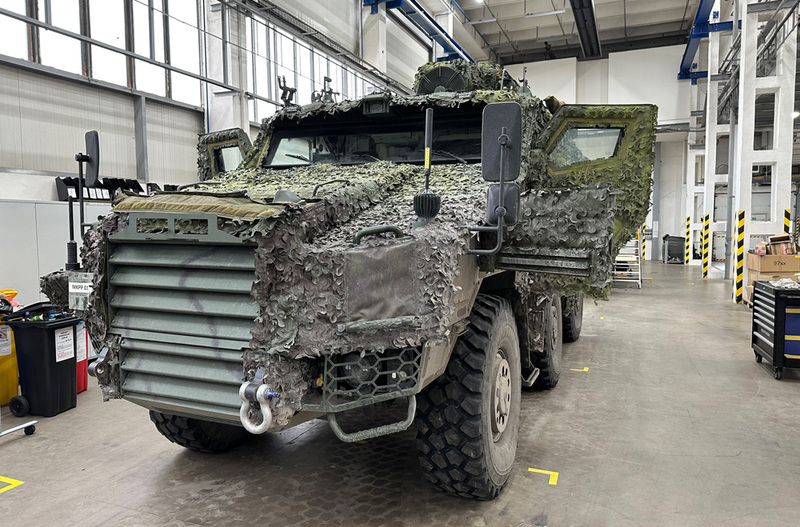 Picture: TITUS armoured vehicle for the Czech Armed Forces | Michal Pivoňka / CZ DEFENCE
Picture: TITUS armoured vehicle for the Czech Armed Forces | Michal Pivoňka / CZ DEFENCE
The ground troops will also receive the first four upgraded T-72M4 CZ tanks and another 13 Leopard 2 A4 battle tanks are expected to arrive from Germany. On the subject, Koudelka said, "The purchase of ballistic protection equipment for individuals will also continue, which is one of the key commodities to ensure the comfort, protection and safety of individual soldiers. Our Air Force and Air Defence will receive all twelve modern US H-1 helicopters, 8 MADR radar kits and will continue to upgrade CASA aircraft and Mi-171 and Mi-6 helicopters. In the area of electronic warfare, we also expect the delivery of both sets of the DPET mobile passive surveillance system and the STARKOM tactical jammer.
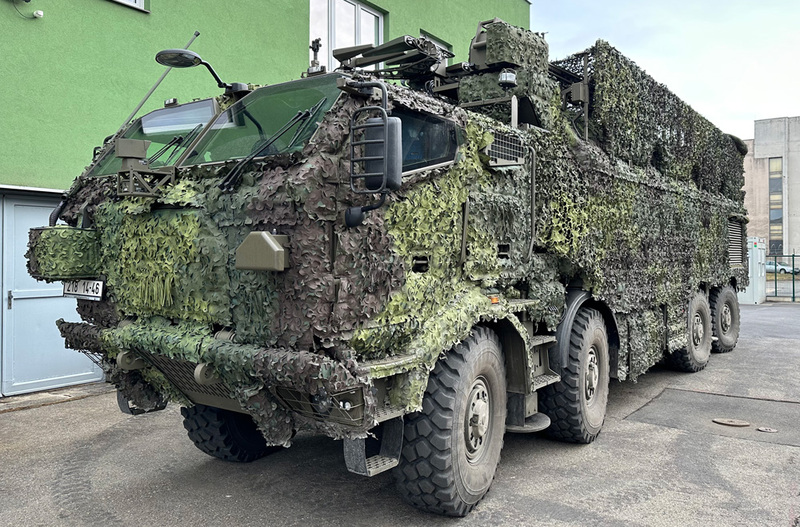 Picture: Specialized STARKOM vehicle for the Czech Armed Forces | Michal Pivoňka / CZ DEFENCE
Picture: Specialized STARKOM vehicle for the Czech Armed Forces | Michal Pivoňka / CZ DEFENCE
Satellite communication systems and radio stations will be supplied for the communication needs. This year, we plan to conclude a number of other contracts, for example, for the procurement of a modular combat suite for the 4th Brigade Combat Team, tactical unmanned reconnaissance vehicles, additional long-range missiles for the SHORAD system, and the necessary conventional ammunition and standby ammunition." This year's tasks also include upgrades, particularly to Gripen, W-3A Sokol and CASA aircraft. "We are paying particular attention to ensuring the life cycle of existing and newly acquired equipment. That is why we will also conclude service support contracts for CASA aircraft and MADR radars and newly acquired H-1 helicopters. For the logistics needs, we are talking about the acquisition of additional vehicles, trailers, transporters, loaders, workshop equipment and also the acquisition of firefighting syringes for the necessary replacement of the equipment of the army firefighting units," Šulc added. This year will also see the start of the procurement of a universal wheeled platform for the engineer troops to ensure their interoperability.
The subsequent parliamentary discussion turned to the topic of the contract for the procurement of hand grenades, which the ministry is planning to conclude with the previous winner of the tender, Colt CZ Defence Solutions. The company is expected to supply ammunition worth CZK 413 million by 2027. Czech arms companies will participate in 60 percent of the contract and the production of the grenade will be relocated to the Czech Republic. MPs Ratiborský and Růžička pointed out that the Czech Republic is capable of producing its own grenade without the involvement of foreign industry and supplies from abroad, whereupon Lubor Koudelka, chief director of the armaments and acquisitions section of the MoD, said that the contract is based precisely on the requirements of the Czech Army and the defence committee has already discussed the purchase once. "Soldiers are already very well trained in the use of this grenade and know its good qualities, and in this context, certain training methods are also in place, which means a reduction in the risk of endangering the health and lives of soldiers. If another hand grenade were introduced for use within the Czech Army, this danger could be increased," Koudelka explained. In preparation for the implementation of this contract, the transfer of technology for the production of grenades to the country is already underway. In this context, we asked the Director for External Relations and spokesperson of Colt CZ Defence Solutions Eva Svobodová to respond. We have our own production, research and development here, we employ Czech citizens, we pay taxes here, we are a major exporter, we are a guarantor of national self-sufficiency in small arms. We therefore regret that Mr Růžička is repeatedly attacking our group and its subsidiaries and using them for political warfare, especially in these turbulent election times. No other manufacturer in the Czech Republic produced in 2017 and even today does not produce tested NATO-certified grenades that are safe for our soldiers," the spokeswoman said.
The MPs were also interested in the introduction of a longer-range air defence system (air defence system) into the armament of the Czech Armed Forces and the issue of the implementation of military trials of the MADR system. In response to the air defence system, General Střecha pointed out that, in particular, the acquisition costs do not allow such systems to be procured in the concept of the development of the army until 2030. "However, work is now underway on a new security and defence strategy and in the context of this, a long-term defence outlook will be prepared and subsequently a concept for the construction of the Czech Army. And there we are very seriously considering going into something that will provide us with protection against ballistic missiles on the territory of the Czech Republic," the general said. As far as MADR is concerned, the general said, the issue is the stability of the system, not the failure rate. "Right now there's a problem in the area of the sensitivity of the secondary radar, which the manufacturer is working to correct," Gen. Střecha, who also expects the military to successfully test these systems so that our Army will have them available by the end of the year.
Also this time around, we asked committee members a poll question based on planned acquisitions for 2023: What priorities should MOD address this year, and what specific acquisitions should the department tackle this year?
Lubomír Metnar (ANO), Chairman of the Committee
First and foremost, the Ministry of Defence should complete the planned acquisitions resulting from the Concept for the Build-up of the Army of the Czech Republic, both in the direction of air defence and heavy ground and transport equipment.
Jan Hofmann (ODS), Vice-Chairman of the Committee
The main priority this year should be the signing of the contract for tracked infantry fighting vehicles. This is an acquisition that has been delayed for many years and must be carried out. Negotiations will continue this year on the concept of supersonic aviation and its future shape. For me, the purchase of large drones, which will be the first large assets in our army, is also a rather interesting acquisition. So this is a big leap forward in this area. There are also a number of smaller but equally important acquisitions, such as the purchase of light assault vehicles or modular combat suits. The inclusion of fourteen Leopard 2A4 tanks donated by Germany is a definite one. UH-1 and AH-1 helicopters and MADR radars are expected to be delivered this year.
Stanislav Blaha (ODS), Member of the Committee
I see two priorities for the Ministry of Defence this year. The first one is to continue the acquisition processes from last year and to implement them gradually. There should also be modernisation of armaments, for example in the construction of the 7th Mechanised Brigade.
The second priority is clearly the purchase of CV90 IFV vehicles. At the end of last year, the Ministry signed a Memorandum of Understanding with the Swedish counterpart, which formalises the contractual relationship between our governments and the vehicle manufacturer. According to the memorandum, the acquisition contract could be concluded this spring. It is crucial for the ministry and our military that the acquisition proceeds in an orderly manner and in the shortest possible time.
The purchase of the UH-1Y Venom and AH-1Z Viper helicopters, Heron 1 drones and the SHORAD air defence system should definitely be completed. A decision should also be taken on the future direction of the supersonic air force through the acquisition of F-35 aircraft. I believe that these projects are important for Czech security in view of the current security crisis in Europe.
Jiří Horák (KDU-ČSL), Member of the Committee
In 2023, I consider the biggest priority for the defence sector to be making significant progress in the modernisation of our Army. It is no secret that our Army has been significantly underfunded for many years and its military equipment is in a truly trivial state. This is directly related to your second question, concerning acquisitions this year. It is absolutely essential to move forward fundamentally this year with the acquisition of infantry fighting vehicles (IFVs) and fighter aircraft. In the case of the IFVs, representatives of our state are currently negotiating intensively with Swedish partners on the purchase of 210 of these vehicles, and by the end of January we can expect an offer from the Swedish side, which will then be assessed by the Czech side. According to the signed memorandum, the final contract could be signed by the end of May this year, with at least 40% of the total contract to be shared by the Czech defence industry. In my opinion, the acquisition of the IFVs will fundamentally strengthen the operational capabilities of the ground forces of our Army, whether on the territory of the Czech Republic or in foreign operations. As regards the acquisition of fighter aircraft, as is well known, the Czech side is negotiating with its American counterparts on the purchase of 24 F-35s. Here, the negotiations are only at an early stage and it will be a success if there is a significant shift in negotiations this year. Beyond these two strategic acquisitions, I consider the delivery of the first eight Venom multi-role helicopters and four Viper attack helicopters to be important this year. According to the available information, the American side will donate another eight operational machines to us and our army should have 20 American helicopters this year.
Karel Krejza (ODS), Member of the Committee
I consider the construction of the heavy brigade to be a priority for 2023. Changes in the budget have been arranged for this purpose. Crucially, this is not a one-off increase, but a pro-growth trend. According to the plan, in 2023, 2024, 2025, from 1.52% of GDP to 1.66% of GDP, or up to 1.89% of GDP. We are approaching 2%. But it is important to distinguish the budget – the highest increase in the volume of funding is in programme funding from 31% to 44%, i.e. armaments, and the decrease is in mandated expenditure, pensions and current expenditure. For the construction of the heavy brigade, which is currently a priority, the increase in funding is sufficient. Investment in complete weapon systems will be necessary in future years.
Michal Ratiborský (ANO), Member of the Committee
I will mention here the actions that have not been signed and, in my view, should be signed this year, so as not to limit or even jeopardise the future defence and protection of our country. The number one priority is clearly the signing of the contract with the IFV supplier. The Minister of Defence was very critical of the previous Government and Minister's approach (selecting from three suppliers) and decided to cancel the tender and approach the Swedish manufacturer BAE directly with the guarantee of the Government of Sweden. As was said at the committee today, even this route is not and will not be as easy as it may have seemed. It will not be a bilateral government x government contract, but the BAE supplier must be part of the contract directly. So I just firmly believe that the MoD, led by the mistress, will see this through so that her criticism does not have to be directed at her own nest later.
In fact, everything that was started by the previous government remains to be done in 2023. The multi-purpose helicopters will be supplemented with additional units in compensation for the Mi-24s delivered by our side, the extension of the MADR military trials will hopefully not delay the inclusion in the armament of the Czech Armed Forces, and the same for the passive DPET system. SHORAD, NATO gun with fire control system. These are all large projects where the Czech industry will be involved, but not significantly. That is why I am keeping a close eye on smaller actions where we are able to cover 100% of Czech production - hand grenades, RPGs and others – here I see attempts to outsource directly, simplistically without emphasizing what the MoD keeps proclaiming – quality, price and involvement of Czech manufacturers in the first place – quality is indisputable, but with price and maximum use of Czech manufacturers the MoD is currently in a bad way.











